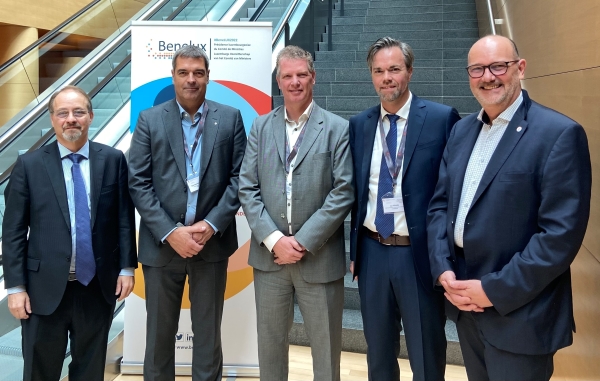 Credit: HPCN
Credit: HPCN
On Wednesday 19 and Thursday 20 October 2022, under the chairmanship of the High Commission for National Protection (Haut-Commissariat à la protection nationale - HCPN), the directors and managers of the Belgian, the Netherlands and Luxembourg (Benelux) crisis centres as well as the Secretary General of Benelux, Alain De Muyser, met in Luxembourg for a workshop entitled “Lessons learned from the pandemic”.
Representatives and experts in the field of crisis management and health from the Greater Region and North Rhine-Westphalia were also present.
The High Commissioner for National Protection, Luc Feller, recalled the 30 months of crisis management since March 2020 and warned that “the virus will remain – until proven otherwise – a reality”. In addition to the COVID-19 crisis, security and energy risks have been added this year with the war led by Russia in Ukraine. The keyword for the coming months is, according to Luc Feller, “anticipation” in order to prepare the actors involved in crisis management for all possible scenarios, in particular in order to manage situations which could affect “our societies in depth”.
This is why, within the framework of its priorities for 2022, the Luxembourg presidency has determined as one of its three priorities the theme "emerging stronger from the pandemic", and the annual plan of the Benelux Union has determined as a flagship project the holding of a workshop aimed at sharing at Benelux level the conclusions of the “lessons learned” exercises that take place in the Benelux Member States and its neighbouring regions and countries.
The Secretary General of Benelux, Alain de Muyser, said: "The ambition now is to achieve the optimisation of the flow of information between the crisis centres and the complementarity of actions between neighbours to ensure a harmonised response to future crises that may have cross-border effects. The Benelux is ready to assume its coordination and interface role.”
This workshop thus made it possible to discuss three concrete themes, namely:
1) The impact of the pandemic on the organisation of crisis management structures and more particularly:
- Horizontal and vertical organisation of crisis management structures;
- The evolution over time of the decision-making structures, in particular of the crisis cell and the related working groups.
2) The significant role of logistics and the importance of creating future resilient strategic stocks, and more specifically:
- Needs assessment and inventory of equipment available from different actors (national stock, hospitals, care homes);
- The purchase of equipment in an international market that no longer works;
- Partnership with the private sector;
- The importance of international cooperation in the acquisition of equipment;
- Adopting a centralised or decentralised approach to logistics coordination and materiel acquisition;
- The establishment of a purchasing centre and the management of the national stock;
- Public procurement regulations, particularly at European level.
3) Epidemiological surveillance of COVID-19 and more specifically the means of monitoring the spread and impact of the epidemic in the general population, and more specifically:
- The implementation of large-scale testing in the population, testing in accommodation structures, methods of access to tests, use of self-tests;
- The organisation of contact tracing, its interests and limits in the surveillance and control of a COVID-19 type pandemic;
- The organisation of monitoring to obtain an overview of the key figures of the evolution of the pandemic on a national scale. Methods of data collection, compilation and processing thereof;
- The reorganisation of care in the context of the COVID-19 pandemic – focal point on the organisation of primary care for non-COVID-19 pathologies, teleconsultation;
- The reorganisation of hospital care: methods of access to the hospital, specific COVID-19 care and reorganisation of hospital services. Maintenance of current hospital activities (emergencies, consultations, interventions, patient follow-up, etc.);
- Living together with a virus that doesn't seem to go away.








